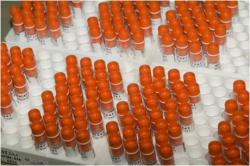Project 13: Safety
 Project Title
Project Title
| Pharmacokinetic interaction between the antimalarial combination artemether/lumefantrine and antiretroviral therapy including nevirapine or lopinavir/ritonavir in HIV-infected adults. |
Project Location(s)
|
Groote Schuur Hospital, Clinical Pharmacology Research Ward, Cape Town, South Africa |
Lead Principal Investigator
|
Prof. Karen Barnes, University of Cape Town, South Africa Karen Barnes' research interests are mainly the comprehensive evaluation of malaria treatment policy changes in Southern Africa and improving antimalarial dosing regimens for vulnerable populations (particularly young children, those living with HIV/AIDS and pregnant women). She is passionate about ensuring that evidence-based policies are effectively implemented into public sector practice. Within the 200,000km2 of the Lebombo Spatial Development Initiative (LSDI) areas in Mozambique, Swaziland and South Africa she has worked with the malaria control programmes and the Medical Research Council to develop the tools and skills essential for the successful implementation and monitoring of their new malaria treatment policies. Barnes' work in malaria started when she was appointed as a member of the national Malaria Advisory Group. She subsequently joined the Regional Malaria Control Commission, the ACT consortium, Worldwide Antimalarial Resistance Network, and a number of World Health Organisation committees that guide malaria treatment policy |
Other Principal Investigators
|
Co-investigators: Dr T Kredo, Dr J-S van der Walt, Prof G Maartens, Dr K Cohen, University of Cape Town, South Africa Collaborators: Prof PJ Smith, University of Cape Town, South Africa Prof F Little, University of Cape Town, South Africa Prof Niklas Lindgårdh, Mahidol University, Bangkok, Kingdom of Thailand Dr Lasse Vestergaard, Centre for International Health and Development, University of Copenhagen, Denmark |
Research Aim(s)
| Safety; Targeting |
Project Background and Rationale
|
Despite the clinical significance of potential interactions between antimalarials and antiretrovirals, no drug interaction studies have been published. The increasing access to antiretroviral agents in the tropics has made defining potential interactions between widely used antiretrovirals and antimalarials urgent. A series of studies will be conducted to inform appropriate ACT dosage regimens to treat malaria in AIDS patients on antiretroviral therapy (ART). For ethical reasons, studies will initially be conducted in HIV-infected patients without malaria, to estimate the direction and magnitude of drug interactions to inform subsequent studies in patients with both HIV/AIDS and falciparum malaria. The project will be conducted in two phases: SEACAT 2.4.1 will be a parallel-design, open-label, pharmacokinetic drug interaction study in two groups of patients:
SEACAT 2.4.2 will be a sequential two-period, open-label, adaptive design pharmacokinetic ACT-ART drug-interaction study to investigate the pharmacokinetics of the antimalarial combination artemether/lumefantrine (AL) and lopinavir/ritonavir (LPV/r) in 18 adult HIV-infected participants. The study will consist of a single dose and a multiple dose pharmacokinetic profile. The dose and dosing interval of AL for the multiple dose pharmacokinetic profile will depend on the magnitude of the single dose interaction. Concentration-time profiles (0‑504 hours) will be obtained in HIV-infected patients to determine the pharmacokinetics of lumefantrine, artemether, dihydroartemisinin, nevirapine, LPV/r, zidovudine, lamivudine and stavudine. The pharmacokinetics of these drugs will be compared between HIV-infected patients who are not on ART, those on nevirapine-based ART and those on LPV/r-based ART. Safety will be assessed throughout the study. |
Current Status of Project
|
Manuscripts for publication are in process of being written |

